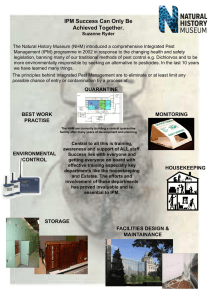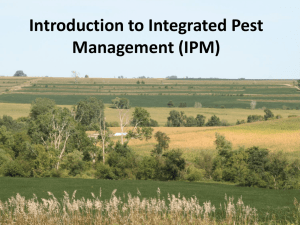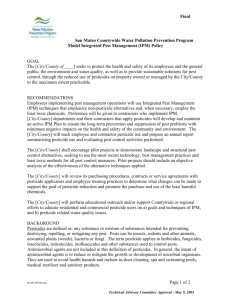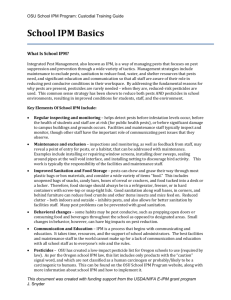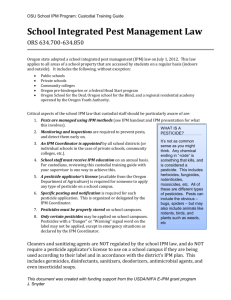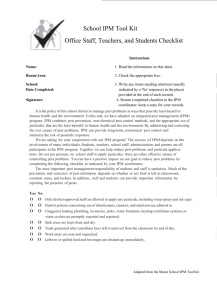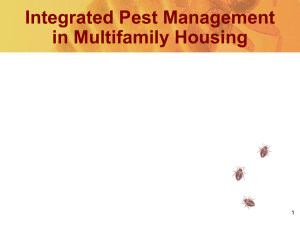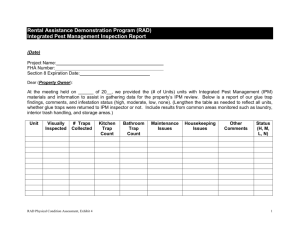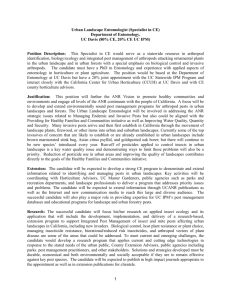2014 IPM Academy Agenda
advertisement
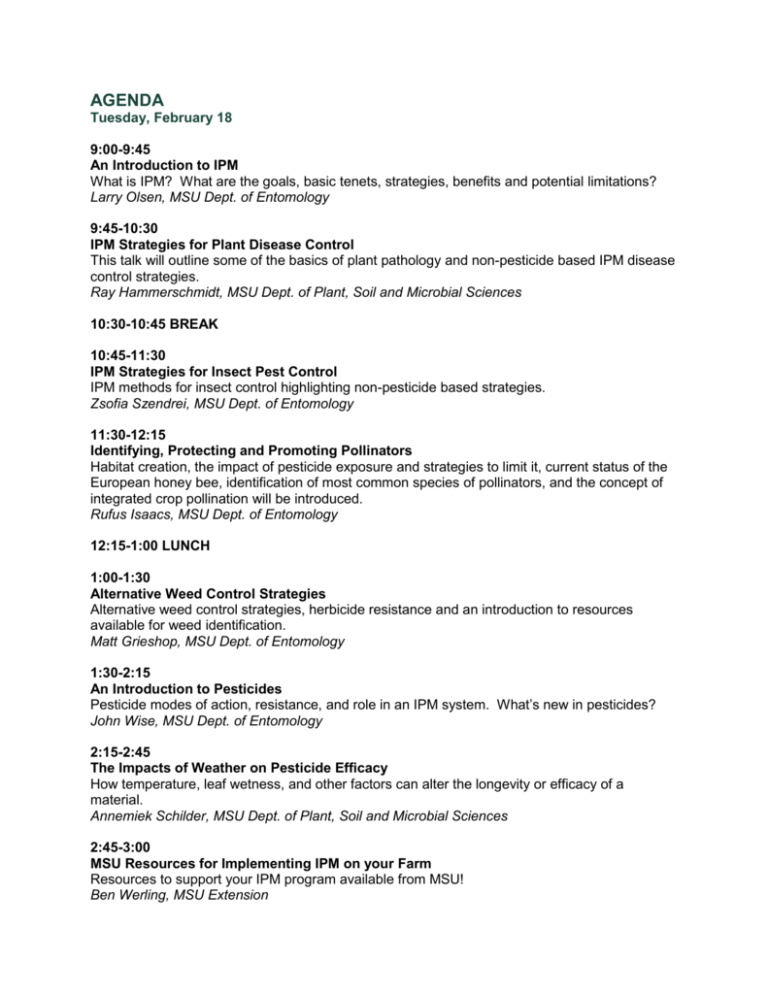
AGENDA Tuesday, February 18 9:00-9:45 An Introduction to IPM What is IPM? What are the goals, basic tenets, strategies, benefits and potential limitations? Larry Olsen, MSU Dept. of Entomology 9:45-10:30 IPM Strategies for Plant Disease Control This talk will outline some of the basics of plant pathology and non-pesticide based IPM disease control strategies. Ray Hammerschmidt, MSU Dept. of Plant, Soil and Microbial Sciences 10:30-10:45 BREAK 10:45-11:30 IPM Strategies for Insect Pest Control IPM methods for insect control highlighting non-pesticide based strategies. Zsofia Szendrei, MSU Dept. of Entomology 11:30-12:15 Identifying, Protecting and Promoting Pollinators Habitat creation, the impact of pesticide exposure and strategies to limit it, current status of the European honey bee, identification of most common species of pollinators, and the concept of integrated crop pollination will be introduced. Rufus Isaacs, MSU Dept. of Entomology 12:15-1:00 LUNCH 1:00-1:30 Alternative Weed Control Strategies Alternative weed control strategies, herbicide resistance and an introduction to resources available for weed identification. Matt Grieshop, MSU Dept. of Entomology 1:30-2:15 An Introduction to Pesticides Pesticide modes of action, resistance, and role in an IPM system. What’s new in pesticides? John Wise, MSU Dept. of Entomology 2:15-2:45 The Impacts of Weather on Pesticide Efficacy How temperature, leaf wetness, and other factors can alter the longevity or efficacy of a material. Annemiek Schilder, MSU Dept. of Plant, Soil and Microbial Sciences 2:45-3:00 MSU Resources for Implementing IPM on your Farm Resources to support your IPM program available from MSU! Ben Werling, MSU Extension 3:00-3:15 BREAK 3:15-4:00 How will Invasive Pests Impact our IPM Programs? Review of top invasive pests impacting agriculture at this time, implications for pest management on farms, and the flexibility of IPM. Nikki Rothwell, Director of the NW Michigan Horticultural Research Center, MSU 4:00-4:45 Round Table Discussion on IPM Implementation on the Farm During this free-form Q&A, participants will have the opportunity to ask questions and discuss topics surrounding the implementation of IPM on their farm. Growers will provide examples of obstacles and opportunities for IPM implementation on their farm and the resulting economic or environmental impacts. Facilitated by Larry Olsen, MSU Dept. Of Entomology 4:45-5:00 Evaluation and continuing education credits available Wednesday, February 19 Morning Sessions Soil health: What is it, Why is it Important, and How Can it be Managed? Soil is one of the most important but often the most ignored components of successful plant production. Understanding the importance of soil management and how soil interacts with nutrients, water and pesticides will be explored during this session. Attendees are encouraged to bring soil test results to get a personal recommendation for their site and crops. This a cross commodity session. Landscape Design and IPM: Getting it Right from the Start Many landscape plant problems are rooted in poor design or poor plant selection. This session will feature a discussion on landscape design, placement and selection of ornament plants and their implications when dealing with pest management in landscapes. Stewardship of Pesticides in Michigan Field Crops Farmers use many tools to manage weeds, insects and diseases in their cropping system. Still, chemical controls are often favored for their ability to provide efficient and effective crop protection. This session will offer an overview of the many pesticide options available to field crop producers, discuss their modes of action and highlight management strategies that can be used to limit the development of pesticide resistance as well as practices that can be used to manage pest populations that already exhibit resistance. Hops: Getting Started The morning hop session will cover an introduction to hops, soils and site selection, understanding soil and tissue testing, variety selection, trellising and irrigation and establishment costs. Afternoon sessions Hop Management The afternoon hop session will cover planting and training hops, fertilizer and nutrient requirements, common insect mite and disease problems, scouting for insects and diseases, weed management, and harvesting and processing hops. Ecologically-Based Fruit Pest Management Growing fruit can be an input intensive, challenging endeavor. Session participants will learn about ecologically-sound preventative pest actions, pest management approaches, and horticultural practices that can help lessen the challenge of growing fruit. Managing Pests in Diverse Vegetable Rotations Michigan growers produce a wide diversity of vegetables at many different scales, which are challenged by a sometimes overwhelming diversity of insect, disease and weed pests. This session aims to introduce conventional and organic growers to an integrated set of control tactics—including cultural, chemical, mechanical and biological approaches—that can be used to manage pests in an economically and environmentally sound way. Solving the Puzzle - IPM Planning and Implementation for Real-world Field Crop Production Systems Integrated pest management makes sense on paper, but how do you fit this broad philosophy into a real-world cropping system? In this session we will discuss how to develop a farm IPM plan that encourages pest management decisions that focus on maintaining efficiency and maximizing profitability. In addition, a panel of farmers will share with participants how they have successfully incorporated IPM principles into their farm plans. Emerging Pest Problems of Michigan Landscapes New or invasive pests can cause significant economic and ecological damage. This session will review current and potential pest problems to Michigan landscapes such as oak wilt, hemlock woolly adelgid, thousand canker disease, Asian longhorn beetle and more.
